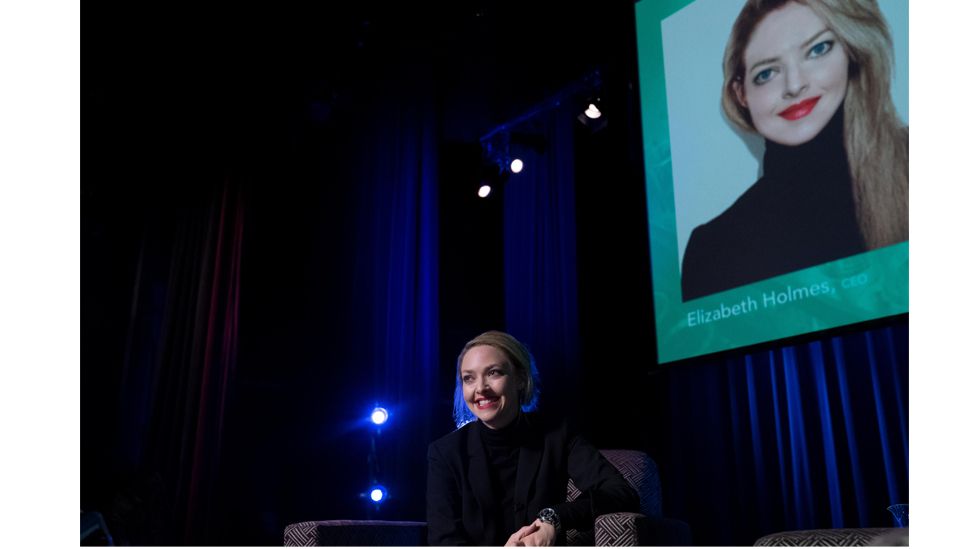TV’s latest obsessions

“There’s only one thing you need to know about Elizabeth Holmes,” Stanford professor Phyllis Gardner (played by Laurie Metcalf) says in The Dropout, the absorbing, jaw-dropping series about the once idolised, now criminally convicted founder of the biotech company Theranos. “She’s a fraud. She’s always been a fraud.” She’s not the only one. We live in an age of fakes, on screen and off. Holmes, played with electrifying intensity by Amanda Seyfried, may be the avatar of the type. Her company promised easy, pin-prick blood tests, and faked results to get there. But we are awash with TV series and films based on real-life rule breakers.
More like this:
– Why we’ve got the Vikings wrong
– Britain’s most incredible art theft
– Netflix’s ‘fake heiress’ drama is a hit
Netflix’s most popular recent series include Inventing Anna, with Julia Garner as the poseur and would-be socialite Anna Delvey, and the documentary The Tinder Swindler, in which a swipe right ultimately leads women to financial ruin. Bad Blood, Adam McKay’s feature film with Jennifer Lawrence as Holmes, is in development.
There seems to be a perfect storm of reasons why we’re now surrounded by fakes. Recent politics has put us in a world where truth and reality are regularly, and nonsensically, challenged. Social media also plays a role. Maria Konnikova, author of The Confidence Game: The Psychology of the Con and Why We Fall For It… Every Time (2016), tells BBC Culture that while there has long been a fascination with scammers, “The explosion of social media has made conning easier – we are better targets and con artists can craft better stories – and has given cons increased visibility”.

Netflix’s Inventing Anna tells the compelling story of a real-life fake heiress (Credit: Netflix)
And there is the simple, enduring fact that fraudsters make for great narratives. Alex Gibney directed The Inventor: Out for Blood in Silicon Valley, the 2019 documentary that is still the most potent work on Holmes. He tells BBC Culture, “Usually in these frauds, what you have at the heart of them is a storyteller. Elizabeth Holmes told us a story that we really wanted to hear: Stanford dropout, just like Steve Jobs dropped out of Reed College, by the dint of her own determination and her desire to make the world a better place, ends up becoming a billionaire, and finds a way to help us all.” If only it were all true.
The facts of the case are so dramatic that The Dropout doesn’t even exaggerate much. The fictional version is more blatant, the dialogue at times blunter than real life. But it is also eye-opening in the way it takes us inside Holmes’ stubborn mind, allowing us to understand what drives her. As in Inventing Anna, this series doesn’t glorify the deceptions, but allows for begrudging admiration. As Konnikova says, “it’s easy to get wrapped up in the glamour of the con itself – can you believe she was able to pull that off?!’
The Dropout’s characters are vivid and deeply realised, as the series charts Holmes’s rise and fall, from wonder-girl founder of a company eventually valued at $10 billion, to a scoundrel who lied to people about their health. Seyfried captures both Holmes’s opaque, brittle outer layer and the increasing tumult inside, as well as the spooky, wide-eyed stare, and the distinctive deep voice, which Holmes reportedly lowered intentionally in order to sound more authoritative. On screen, the voice changes so abruptly, it might hurt your throat just to hear it. “Do you have a cold?” one of her investors asks.
In The Dropout, Holmes begins with an ambition, to get rich, and an admirable cause, to improve health care. But when the Theranos blood-testing machine – which she did not invent herself – fails to work soon enough, she comes to resemble a pouty child wilfully refusing to accept reality. Instead, she falsifies results. “We faked the demo,” Holmes tells her company’s COO and her secret lover, Sunny Balwani (Naveen Andrews), in one of those blunt bits of dialogue. He replies, “Don’t tell anyone else.”

In The Dropout, Amanda Seyfried stars as the biotech scammer Elizabeth Holmes (Credit: Beth Dubber/ Hulu)
Seyfried is surrounded by a terrific cast, including Stephen Fry as Ian Gibbons, the honest chemist who finds himself in legal jeopardy because of his association with Holmes. “I believed in her. I looked in her eyes, and I thought I could see the future,” he says to his wife (Kate Burton). Holmes also convinces many powerful men, including former US Secretary of State George Shultz (Sam Waterston), who was charmed by her, and joined the Theranos board of directors.
“Their charisma is their power, so they’re easy to side with,” Konnikova says of con artists, while pointing out that we should never forget they are also criminals. As observers, she notes, “it’s convenient to separate ourselves from the victims, thinking we’d never be so dumb/gullible/greedy/fill in the blank.”
But the victims have their reasons. The “Tinder Swindler”, Simon Leviev, posed as a billionaire, and scammed one woman into loaning him money that he used to fly the next woman on his private jet, in a social-media Ponzi scheme. “The man I loved was never real. He faked everything,” one of his victims says in the documentary. It’s not as if she never thought to Google, but her on-line searches revealed legitimate-seeming articles about his family of diamond dealers. Any catfisher knows how to cover his tracks today. And the allure of a glamorous romance outdid any scepticism she had, something that says a lot about how people wish to believe in a dream, even when their brains tell them otherwise. “You still have this fairy tale that’s going on in your phone,” that victim says. That will to believe is as strong for everyday people on Tinder as it was for the tycoons who invested in Elizabeth Holmes’s misbegotten dream.
Messianic passion
Intersecting with these con-artist stories right now is another sub-genre of TV show that depicts the stories of disruptive entrepreneurs – not all of whom were criminals like Holmes or Delvey, but who fast-talked their way to success, fuelled by hubris and talking big, even when their companies’ financial reality didn’t match their rosy depictions. In Showtime’s Super Pumped: The Battle for Uber, about the creation of the rideshare app, Joseph Gordon-Levitt gives a love-to-hate-him performance as its controversial co-founder Travis Kalanick, who broke rules and invaded privacy in the process of changing transportation as we know it. Coming soon is Apple TV+’s WeCrashed, with Jared Leto as Adam Neumann, the high-flying, fast-talking co-founder of WeWork. Both founders were eventually forced out of the companies they started.
In addition to their power to charm and persuade, disruptive entrepreneurs often share a messianic passion. “We are in the world-changing business!” the fictionalised Kalanick shouts to a roomful of his employees in Super Pumped. In the series, Kalanick and his company are the picture of bro culture run amok. Gordon-Levitt depicts him as a man whose bombastic self-confidence is matched by his cleverness.

Super Pumped: The Battle for Uber shows the rise and fall of a controversial entrepreneur, played by Joseph Gordon-Levitt (Credit: Elizabeth Morris/ Showtime)
In SuperPumped, Kalanick, like the dramatised Holmes, displays a childish insistence on succeeding no matter how much he has to bend the rules, including hiding some privacy-invading code from Apple executives so Uber will be accepted on the App Store. In the fictionalised version, an employee asks “Is that legal?” about one of their many ploys, to a round of laughter from the room of execs. Kyle Chandler plays venture capitalist Bill Gurley, a mentor to Kalanick and, unlike him, a genuine grown-up, and Uma Thurman gives a sly, near-caricature of Arianna Huffington, who advises Kalanick and joins Uber’s board. In the series, neither can overcome Kalanick’s unbounded and often unfounded confidence. In reality, he did change the world, though. The word Uber is now a verb, the company’s app an essential part of life for many.
The reckoning
Sometimes the fakes and hubris-filled hustlers get their comeuppance and observers get some satisfaction. As Gibney points out, our fascination with these figures is complicated. “People invest in that idea [of them], but then of course they also want them to be punished, which is a way of reckoning with that kind of vicarious thrill. You want to see them pull off the heist, and then you want to see them get caught by the cops.”
Holmes, convicted on four charges of fraud, is set to be sentenced in September. Leviev (real name Shimon Hayut) spent 15 months in prison in Israel. Anna Sorokin, the real person behind the sham Anna Delvey, served nearly four years in a New York prison, and is currently in detention fighting deportation to Germany. She recently told the New York Times what she is reading: Super Pumped, the non-fiction book on which the Uber series is based. That too-perfect answer leaves us wondering if she’s duping us even now.
Holmes arrives in a long line of fakes. When she named her Theranos machine the Edison, after one of her inventor-idols, it was more revealing than she might have intended. Gibney says of Thomas Edison himself “there was a long time where he faked the success of his light bulb, because he felt: well, I’m going to get there sooner or later”. However he also points out one crucial difference: “Edison ultimately came up with the goods”.
The Dropout is on Hulu in the US and on Disney + in the UK; Super Pumped: The Battle for Uber is on Showtime, with a UK release date to be announced. WeCrashed premieres on Apple+ on 18 March.
Love film and TV? Join BBC Culture Film and TV Club on Facebook, a community for cinephiles all over the world.
If you would like to comment on this story or anything else you have seen on BBC Culture, head over to our Facebook page or message us on Twitter.
And if you liked this story, sign up for the weekly bbc.com features newsletter, called The Essential List. A handpicked selection of stories from BBC Future, Culture, Worklife and Travel, delivered to your inbox every Friday.








